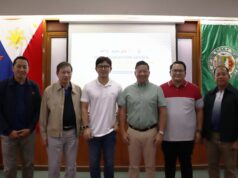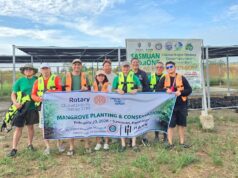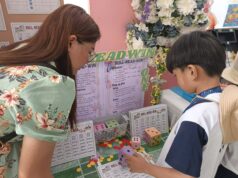In a letter submitted to Executive Secretary Salvador Medialdea and other high ranking officials of the government, lawyer Ernesto Francisco cited two scientific publications, including one authored by Sanofi experts, indicating that the pharmaceutical firm knew of the vaccine’s dangers but still pushed for the massive vaccination of Filipino children starting in 2015.
Francisco provided Punto with a copy of his letter which was also addressed to Justice Sec. Vitaliano Aguirre, Health Sec. Francisco Duque III and Solicitor General Jose Calida.
His letter asked the government to “study and pursue legal remedies in the US which the Philippine government may pursue including a request to the US Department of Justice and Attorney General to conduct an investigation of possible violation of the US laws, including the Foreign Corrupt Practices Act (FCPA) and federal statutes on health care.”
He noted that while Sanofi , whose vaccine arm is the Sanofi Pasteur, is mainly based in Paris, France, it also has a branch in Pennsylvania in the US.
Francisco said his request was “in connection with the conduct of clinical trials on the anti-dengue vaccine Dengvaxia known as CYDTVD; the marketing, supply and sale of Dengvaxia to the Philippines and the mass vaccination of Filipino children at a time when even Sanofi ’s own clinical trials showed that there were serious questions on the efficacy and safety of the said vaccine.”
“FCPA is particularly mentioned because of the admissions made by Philippine government officials that they received monetary compensation from Sanofi in connection with their officials functions relative to the conduct of clinical trials on Dengvaxia and the issuance of regulatory approvals to the said vaccine,” Francisco said.
Anomaly
He noted that Sanofi was once implicated in anomalies in the country, as he recalled a decision of the Department of Health dated July 11, 2014 in an administrative case against officials of the San Lazaro Hospital when it established that “Sanofi agents and high-ranking employees engaged in acts of corruption in 2008 at the time when it was selling and supplying the anti-rabies vaccine Verorab to the Philippine government.”
Francisco cited an article which, he noted, was authored by Sanofi experts and went online on Oct. 20, 2015. He noted this was “nine days before Sanofi applied for the inclusion of Dengvaxia in the Philippine National Formulary on Oct. 29, 2015 and two months before the Food and Drug Administration granted marketing approval for Dengvaxia on Dec. 22, 2015 which originally targeted one million Filipino children.”
Francisco said that the article, titled “Development of the Sanofi Pasteur Tetravalent Dendge Vaccine: One More Step Forward” which was published in Vaccine, a medical journal described as the preeminent journal for those interested in vaccines and vaccination, pointed out that “these ongoing (dengue vaccine) trials (then in hospital surveillance period) have generated several questions and lines of investigations, which will be addressed.”
The article also said that “while a critical phase has now been completed, it is important to consider what remains to ensure implementation of the vaccine that will bring the highest benefit to human health.”
Francisco also noted that the article cited challenges including “the need to demonstrate long-term safety” and “the potential risks after vaccination of sensitization to severe dengue infection and of acute viscerotropic disease and neurotropic disease, which are very rare serious adverse events after vaccination with the yellow fever virus (YFV)-17D vaccine.”
He noted that Sanofi ’s statement confirming “the importance of having sufficiently large field efficacy trials to capture an adequate number of cases with which to address such secondary endpoints, or to demonstrate protection against hospitalization and severe disease” suggested that “the mass vaccination of almost a million Filipino children conveniently answered the need for ‘large scale efficacy trials.’”
Variance in efficacy
Francisco said that “based on the results of Phase III of the clinical trials, Sanofi already knew that there was a big variance in the efficacy of Dengvaxis on those previously infected by the dengue virus or seropositive, vis-a-vis those not previously infected by the dengue virus or seronegative which should have prompted Sanofi to finish all six years of clinical trials before marketing Dengvaxia.”
“At the very least, the results of the clinical trials should have prompted Sanofi not to seek regulatory approval of Dengvaxia in the Philippines for those not previously infected by the dengue virus. More importantly, Sanofi should not have pushed for or allowed the mass vaccination of a targeted one million Fiipino children using Dengvaxia without distinction as to who are seropositive and who are seronegative or without any prior test to determine who are seronegative so that would not be vaccinated,” Francisco said.
The article also stated “Beyond the active phase of surveillance during the Phase 3 efficacy trials, the clinical development program for the CYD-TDV (Dengvaxia) candidate vaccine includes a four-year long-term follow-up (LTFU) phase, i.e. the Hospital Phase, starting 13 months after the third vaccine administration and ending five years after completion of the vaccination schedule to assess safety, in line with the WHO guidelines.”
Francisco cited yet another scientific article published in The New England Journal of Medicine on Sept. 24, 2015, titled “Efficacy and Long-Term Safety of a Dengue Vaccine in Regions of Endemic Disease,” authored by those who participated in Phase 3 of the clinical trials, including Dr. Maria Rosario Capeding of the Philippine Research Institute for Tropical Medicine, and employees of Sanofi .
Clinical trials
“It showed that clinical trials consisted of two phases, namely, a two-year active phase including the period of application of the three doses of vaccine injected six months apart or a period of one year which in the Philippines started in June-December 2011 and a four-year long-term follow up phase or long-term follow- up safety analyses’ which ended in 2017,” he said.
Francisco noted that “the announcement of Sanofi on 28 November 2017 that based on up to six years of clinical date, those not previously infected by dengue virus, the analysis found that in the longer term, more cases of severe disease could occur following vaccination upon a subsequent dengue infection,” coincided with the end of the four-year longterm follow-up phase or “longterm follow-up safety analyses.”
He said US Department of Justice had successfully investigated large multinational corporations, including Odebratch, a global construction firm in Brazil and Braskem, a Brazilian petrochemical company, which pleaded guilty and agreed to pay at least $3.5 billion in global penalties with the US, Switzerland and Brazil sharing the penalties.
“The government of US will likely accommodate such request for investigation from the Philippine government. As he noted that apart from having an office in Pennsylvania, Sanofi shares are listed in the New York Stock Exchange in the form of American Depository Slips,” he noted.
Francisco also said “clinical trials on Dengvaxia were also conducted in Puerto Rico, an unincorporated territory of the US, before securing Philippine government regulatory approval.”
He also urged the Philippine government to “create an inter-agency task force and supervise all government actions in connection with the Dengvaxia problem and provide guidance to all government agencies and officials involved in this problem.”
He cited the need to “meet and confer with the parents of the children whose remains were the subject of forensic examination by the Public Attorney’s Office and obtain their consent to the examination of tissue samples taken by the PAO forensics team by local and foreign forensic experts.”
The government must also “engage the services of Filipino and foreign experts to study and determine the cause of death of Filipino children vaccinated with Dengvaxia,” he said.
Francisco also cited the need to “communicate and coordinate with other countries where clinical trials of Dengvaxia were conducted or where Dengvaxia was granted regulatory approvals, or where Dengvaxia was used on their nationals, and exchange information and explore other avenues of cooperation with the said countries.”




